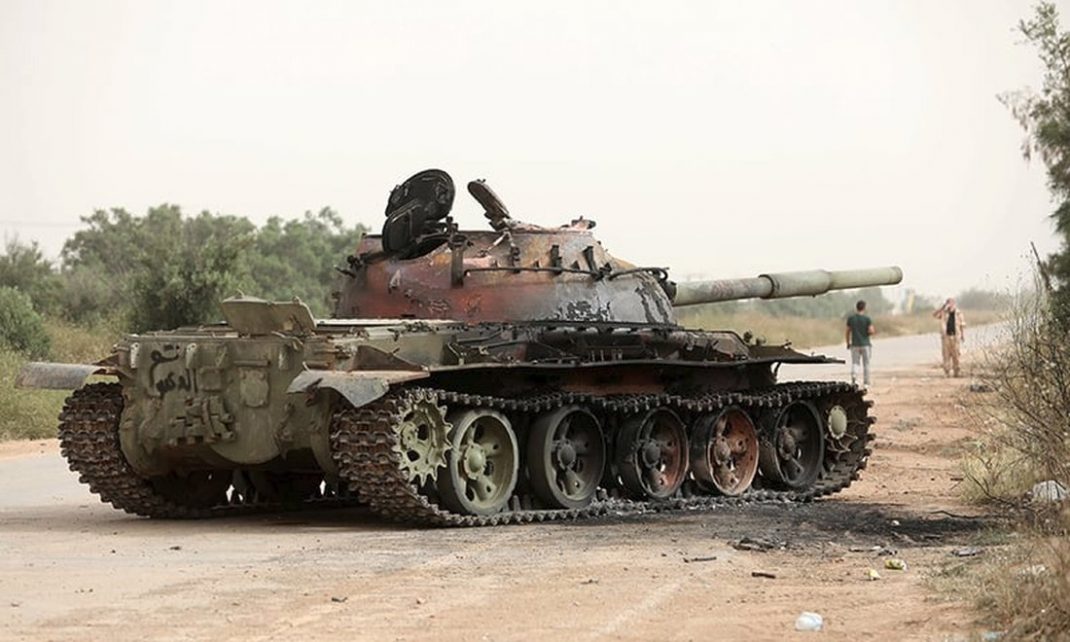By Tim Eaton & Emadeddin Badi

 On April 4, Khalifa Haftar, the commander of the Libyan Arab Armed Forces, a powerful military faction usually known by the initials LNA, launched an offensive to capture the Libyan capital, Tripoli. The attack soon stalled, and a dynamic stalemate has played out since.
On April 4, Khalifa Haftar, the commander of the Libyan Arab Armed Forces, a powerful military faction usually known by the initials LNA, launched an offensive to capture the Libyan capital, Tripoli. The attack soon stalled, and a dynamic stalemate has played out since.
Against this backdrop, divisions at the international level have been laid bare, raising questions about the complicity of some external states and exposing ambivalence or differences of opinion within others. These divisions have so far paralysed the United Nations Security Council.
The meek international response has played a significant part in allowing the violence to continue and indeed escalate as a result of greater external support.
How did we get here?
Before launching his offensive, Haftar had manoeuvred himself into a strong position. On the ground, the LNA had developed into a broad network encompassing the security, economic and, in some cases, political spheres.
The violent campaigns by Haftar’s forces for control of the eastern cities of Benghazi and Derna had been largely completed.
Elsewhere, the LNA had cut deals: the capture of the oil crescent in northeast Libya, where most of the oil wealth lies, and a much publicized expansion in the south saw the LNA broaden its franchise to a wider array of groups.
On the political front, Haftar had been making gains without offering concessions. Since being afforded parity with the internationally recognized prime minister Fayez al-Serraj for the first time in a meeting hosted by French President Emmanuel Macron in the summer of 2017, Haftar became increasingly central in political negotiations.
As the initial attempts of the UN to launch its Action Plan for Libya floundered, France convened a summit of Libyan leaders in Paris in May 2018 that featured Haftar prominently.
When the Italian government held its own summit in Palermo in November 2018, the increasingly confident Haftar refused to participate fully.
As UN efforts were redoubled to find a deal between Serraj and Haftar in 2019, a meeting between them in Abu Dhabi appeared to have produced an agreement.
Leaks from the discussion indicated that Haftar would effectively be granted control of the armed forces and security services and would have the ability to influence the selection of a newly streamlined Presidency Council.
On the eve of the offensive, then, Haftar could claim to have become the pivotal figure in political negotiations and the most powerful military commander.
From a political perspective, the launch of the offensive appears surprising. It was widely rumoured that a UN-brokered
National Conference scheduled for April 14-16 would formalize the Abu Dhabi deal and there was a realistic prospect it would then be endorsed by the Security Council.
At this point, Haftar would be able to claim international legitimacy for his position.
In the aftermath of the launch of the offensive, rumours have emerged that Serraj was stalling or unable to deliver the deal to which he had reportedly signed up. This could, the argument runs, have led Haftar to believe that he would not get the deal he was promised, causing him to move.
On the other hand, Haftar had been openly declaring that his forces would enter Tripoli for years. Planning for the operation had been going on for some time, and the LNA’s expansion into the south was viewed as a precursor to the offensive. Haftar had been amassing forces in Jufra in the centre of the country.
In this context, Haftar’s opponents would be right to question whether he was ever genuinely seeking a negotiated settlement, with talks simply a smokescreen for his military ambitions.
The offensive and its implications
Haftar’s offensive was designed to mobilize friendly forces and convince other forces to ‘flip’ to the LNA. It is important to note that the attack on Tripoli was not conceived in the same way as the brutal building-to-building fighting witnessed in Benghazi.
Instead, it was meant to be a quick operation with limited violence. But this did not come to pass. The mobilization of some of the forces from the cities of Misrata and Zintan, along with a failure of other groups to ‘flip’ as expected, appears to have sunk the plan.
The front lines have not moved significantly since the first evening of the offensive. Aside from the devastation that the prolonging of this conflict would bring, the offensive’s strategic fallout has other dire implications.
First, the entrenchment of militias in Tripoli forebodes a dire humanitarian situation, especially if it deteriorates into urban warfare.
Moreover, the civilian mobilization against Haftar and his promise of military rule signal that, either way, his LNA will not enjoy high levels of legitimacy in western Libya. The increasingly polarized landscape illustrates that the solutions proposed cannot simply rely on coercion to ‘tame’ the population.
Haftar’s offensive has taken many outside Libya by surprise. But there has been debate over who knew what and when.
A report has circulated citing anonymous Saudi officials that Saudi Arabia promised to provide ‘tens of millions’ of dollars to help pay for Haftar’s operation shortly before the attack.
There are also reports that a call between Haftar and John Bolton, the US national security adviser, left Haftar with the impression that the operation had a ‘green light’ from the White House.
While these reports remain unconfirmed, the material facts are that Haftar had been placed in a position where he believed he could launch an attack on the capital without international opposition or open condemnation. If this was his calculation, he has been proved right.
In the immediate aftermath of the attack, Britain, the US and Italy expressed clear statements of criticism. France failed to attribute blame to Haftar for his escalation until the release of a European Union statement on April 11, a week after the offensive had been launched.
The US position soon shifted. The official read-out from an April 15 phone call between Trump and Haftar – the call had been encouraged by Egyptian President Abdel Fatah al-Sisi and Emirati ruler Mohammed bin Zayed – described the two men discussing ‘ongoing counterterrorism efforts’.
This framing of the relationship as based on counterterrorism supported Haftar’s contention that he was seeking to liberate the capital of jihadist groups.
Trump’s stance cascaded through the US government, causing it to stall development of a ceasefire resolution at the Security Council.
Meanwhile, Paris has been keen that any resolution should contain language on counterterrorism, similarly supporting Haftar’s narrative.
Headlines from the UN focused on Russian opposition to the resolution, but this merely masked divisions between the other permanent members.
The Security Council is likely to remain paralysed until a clearer US position emerges.
Meanwhile, regional powers continue to provide support to their allies, which is slowly turning the conflict into a proxy war. The fear is that an absence of an international consensus is perceived as a licence to provide more sophisticated weaponry.
There is evidence that this is already happening. Images of Chinese drones, probably supplied to the UAE and shipped to Libya, have already surfaced.
Subsequently, Turkish-made armoured vehicles were delivered to Tripoli by sea and deployed into battle by anti-Haftar forces. This raises questions of where this escalation might end.
Egyptian and Emirati forces have provided air support for LNA operations in the past. Given this precedent, Qatari and Turkish air support to anti-Haftar forces cannot be discounted either.
The UN arms embargo on Libya has been flouted and the expert charged with investigating violations of it was arrested in Tunisia 10 days before the attack and is still being held.
Where next?
Left unaddressed, Libya’s third civil war threatens to dismantle the fragile modus vivendi of rival administrations in the east and west.
The economic interdependence of these two administrations has been underscored by LNA control of oil infrastructure and the Government of National Accord’s distribution of oil revenues.
There are already signs that eastern institutions are seeking to test whether they can sell oil directly to cut Tripoli out of the loop. The social divisions that are being sown by this violence will also be difficult to undo, amid a real threat that the war will inflame long-standing tensions.
On the other hand, the prospect of one side ‘winning’ is remote. It has been demonstrated that no one can control Libya by coercion alone.
Haftar is unlikely to be able to enter Tripoli and control the state by force. He would be perceived as a usurper by powerful military factions who would continue to oppose his rule.
This would be no recipe for ‘stability’. On the other hand, Haftar’s defeat could lead to the unravelling of his coalition. The prospect that Libya faces is thus perpetual instability.
This will be disastrous for Libya, providing fertile ground for groups such as the Islamic State.
Worryingly, it is difficult to see what will bring this fighting to a close. Haftar has committed his reputation to this offensive and appears to be at a point of no return.
Any retreat or deal will be perceived as failure, or worse, weakness. On the other hand, his opponents cannot be seen to be cowed by Haftar’s power grab. So, while there is talk of returning to the Abu Dhabi parameters, this is likely to be a non-starter.
In the lull, opportunities for other powers such as Russia may emerge. While Moscow restricts western countries’ window for engagement, epitomized by its opposition to the UK-proposed ceasefire resolution at the Security Council, some speculate that Russia might launch an initiative in Libya similar to the Astana Process that sidelined the UN and the western powers in the Syria endgame.
Indeed, western leaders’ compulsion to hedge their bets through non-intervention, especially after Trump’s call to Haftar, leaves a vacuum for others to fill.
If western-led political dialogue under UN leadership is to be rebooted, a revamped blueprint is required. Serraj and Haftar are polarizing figures due the former’s ineffectiveness and the latter’s belligerence.
The formula for an agreement between the two men is unlikely to succeed. The attempt to impose a fait accompli in Abu Dhabi did not work. Instead, the focus should be on widening the scope of those included in negotiations that can be broadened.
Identifying and including individuals from the social and military spheres who are truly representative of their constituencies and willing to commit to the outcomes of a dialogue process is the only means of brokering a sustainable settlement.
Such a reshaping of the purely political process does not mean doing away with the UN Action Plan for Libya: indeed, the national charter that was previously developed through a bottom-up consultation process was a real mechanism to reset Libya’s system of governance.
The focus should be on reassessing who is capable of moving that process on. In doing so, individuals detrimental to the dialogue process, such as Haftar and Serraj, would ideally be cast aside. But this remains unlikely as it would require powerful backers of Haftar to rescind their support, which may be destabilizing in the east.
The most prudent course is to reduce Haftar and Serraj’s influence by broadening the tent.
***
Emadeddin Badi is a non-resident scholar at the Countering Terrorism & Extremism Programme at the Middle East Institute, Washington DC.
Tim Eaton Research Fellow, Middle East and North Africa Programme.
_____________
CHATHAM HOUSE




